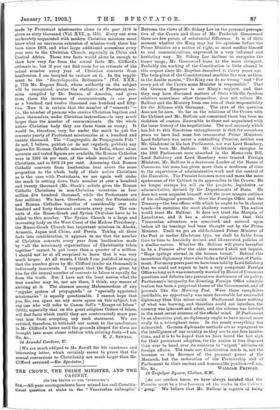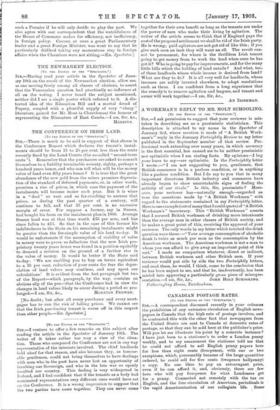THE CROWN, THE PRIME MINISTER, AND THE CABINET.
CTO TM EDITOR OF TUE "spEcreTon.1 your correspondents have missed the real Constitu- tional question at stake in the "Venezuelan imbroglio." Between the views of Mr. Sidney Lee on the personal preroga- tive of the Crown and those of Mr. Frederick Greenwood there are few points of substantial difference. It is of little moment whether the King may lay his opinions before the Prime Minister as a matter of right, or must confine himself to oral communications, expressed in a very informal and hesitating way. Mr. Sidney Lee inclines to recognise the looser usage ; Mr. Greenwood leans to the more stringent. Probably the working of the Constitution is little altered in this respect since Mr. Bagehot described it thirty years ago. The twin-pivot of the Constitutional machine lies now, as then, in the double maxim," The King can do no wrong" and "For every act of the Crown some Minister is responsible." That the German Emperor is our King's nephew, and that they may have discussed matters of State with the freedom relatives sometimes allow themselves, does not relieve Mr. Balfour and the Ministry from one iota of their responsibility for the Alliance with Germany. The crux of the question does not lie here. So far as the relations of the Crown with the Cabinet and Mr. Balfour are concerned there has been no violation of custom discernible to those not acquainted with the inner history of the negotiations. The real anomaly which has led to this disastrous entanglement is that for seventeen years we have had none but ornamental Prime Ministers. Lord Salisbury was never a controlling Premier, neither was Mr. Gladstone in his last Parliament, nor was Lord Rosebery, nor has been Mr. Balfour. Mr. Gladstone's energies in the 1892 Parliament were absorbed in the Home-rule Bill, Lord Salisbury and Lord Rosebery were trusted Foreign Ministers, Mr. Balfour is a dexterous Leader of the House of Commons, but none has given more than a modicum of time to the supervision of administrative work and the control of the Executive. The Premier becomes more and more the mere spokesman of the Cabinet in its approaches to the Crown. He no longer stamps his will on the projects, legislative or administrative, devised by the Departments of State. He does not even acquaint himself with the most meagre outlines of his colleagues' pursuits. Over the Foreign Office and the Treasury—the two offices with which he ought to be in closest touch—he exercises the most shadowy control. The nation would trust Mr. Balfour. It does not trust the Marquis of Lansdowne, and it has a shrewd suspicion that this Venezuelan adventure was conceived and entered upon before all its bearings had been thought out by the Prime Minister. Until we get an old-fashioned Prime Minister of the Peel or earlier Gladstone type, we shall be liable from time to time to hurriedly devised and ill-executed policies of a similar nature. Whether Mr. Balfour will prove hereafter to be a Premier after the older manner I shall not inquire. "Hope springs eternal in the human breast." Behind this incautious diplomacy there also lurks a fatal distrust of Parlia- ment. For many years past we have been told by Lord Salisbury that we could not expect to have a very competent Foreign Office so long as it was constantly worried by House of Commons questions and debates into premature disclosures of its policy. Parliament's incapacity for directing Foreign Office adminis- tration has been a perpetual theme of the Government, and of journals like the Morning Post. Were these complaints justifiable, no opportunity was more favourable for successful diplomacy than this minor crisis. Parliament knew nothing of what was brewing, and therefore could not interfere, the country was ignorant and silent, and the scheme was hatched in the most secret recesses of the official mind. If Parliament be an obnoxious pest, no diplomacy ought to have moved more easily to a triumphant issue. In the result everything has miscarried. German diplomatic methods are as repugnant to the intelligence of our ccuntry as they are to our free institu- tions, and it is to be hoped that we have heard the last sigh for their permanent adoption, for the nation is less disposed than ever to hand over its concerns to " expert " advisers on foreign affairs. The tonic our Constitution needs is, not the increase cr the decrease of the personal power of the Monarch, but the restoration of the Premiership and of Parliament to their ancient and honourable position.—I am, Sir, &c., WLLLIA.11 PRINGLE. 26 Trafalgar Square, Chelsea, S.W.
[As our readers know, we have always insisted that the Premier must be a true foreman of the works in the Cabinet "gang." We believe that Mr. Balfour is capable of being such a Premier if he will only decide to play the part. We also agree with our correspondent that the watchfulness of the House of Commons makes for efficiency, not inefficiency, in foreign policy. Cavour, at once a great Parliamentary leader and a great Foreign Minister, was wont to say that he particularly disliked taking any momentous step in foreign affairs when the Chambers were not sitting.—En. Spectator.]











































 Previous page
Previous page